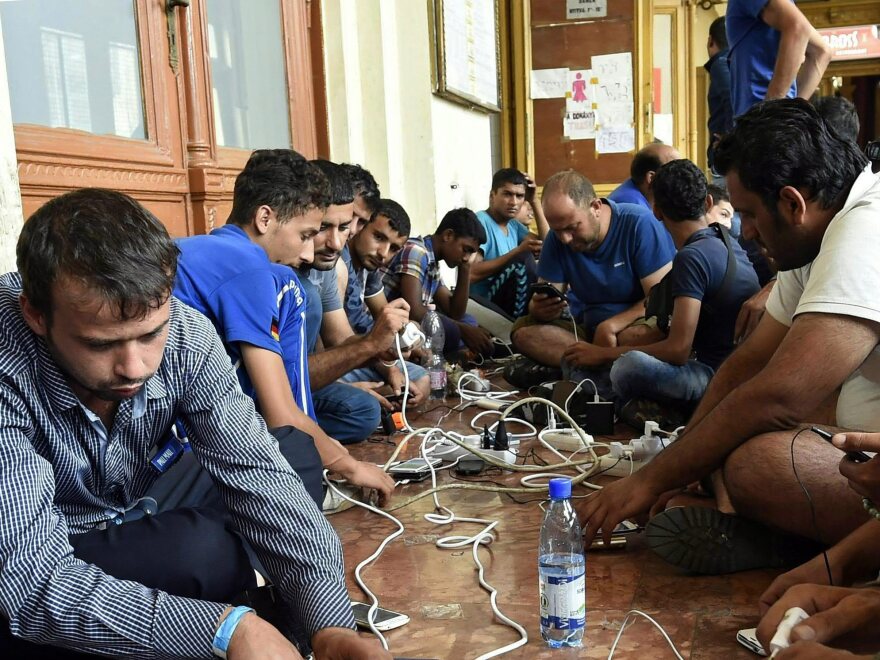Updated at 3:35 p.m. ET
Thousands of migrants flooded into a train station in the Hungarian capital Thursday after police lifted a two-day blockade, but some who boarded a train they thought was going to Germany ended up instead at a refugee camp just miles from Budapest.
The Associated Press reports that "excited migrants piled into a newly arrived train at the Keleti station in Hungary's capital despite announcements in Hungarian and English that all services from the station to Western Europe had been canceled. A statement on the main departures board said no more trains to Austria or Germany would depart 'due to safety reasons until further notice!'
"Many migrants, who couldn't understand either language and were receiving no advice from Hungarian officials, scrambled aboard in a standing-room-only crush and hoped for the best," the AP said.
Scuffles broke out when police ordered the passengers off the train at Bicske, according to the BBC.
Meanwhile, Hungary's prime minister says his country is doing all it can to manage a growing migrant crisis, even as European officials said they will meet this month in Brussels to discuss an effort to "strengthen the European response" to the situation.
Viktor Orban said the influx of refugees into his country is really "a German problem" because that is the intended destination for most of them. Hungarians, along with other Europeans, are "full of fear" he says, because "they see that the European leaders, among them the prime ministers, are not able to control the situation."
"If we would create an image ... just come because we are ready to accept everybody, that would be a moral failure, because that is not the case," Orban said after a meeting with European Parliament President Martin Schulz, according to The Washington Post. "The moral human thing is to make clear, please don't come. Why do you have to go from Turkey to Europe? Turkey is a safe country. Stay there. It's risky to come."
Hungarian police prepare to get migrants off train. They've refused police water and food.… http://t.co/8cEJtxR6IT pic.twitter.com/SYZ8dJSt2y
— Eleanor Beardsley (@ElBeardsley) September 3, 2015
The BBC reports:
"His comments came as Hungarian authorities opened the main rail station in Budapest to hundreds of migrants after a two-day stand-off.
"One train left, but then stopped near a migrant reception centre.
"Migrants mostly from Syria but also from Iraq, Pakistan and Afghanistan resisted efforts by police to get them off the train at Bicske, about 40km (25 miles) west of Budapest. Some were banging on the windows and shouting 'Germany, Germany.'"
Meanwhile, Voice of America reports that British, French and German officials have called for urgent action and plan to hold talks on Sept. 14 in Brussels to address the crisis.
VOA reports: "The three ministers also called for better processing of migrants in Italy and Greece."

As we've reported, the United Nations believes that more than 300,000 migrants have set out for Europe from North Africa and the Middle East on the Mediterranean Sea so far this year, a 40 percent increase on all of last year.
As NPR's Middle East editor Larry Kaplow writes: "On any given day now, hundreds of people, perhaps thousands, are drifting in ships or clinging to boats that are little more than inflatable rafts. They go in other ways, too. Jumping fences in Morocco to get to Spanish territory. Cramming into trucks from Turkey. Riding trains across Europe."
Copyright 2021 NPR. To see more, visit https://www.npr.org.





